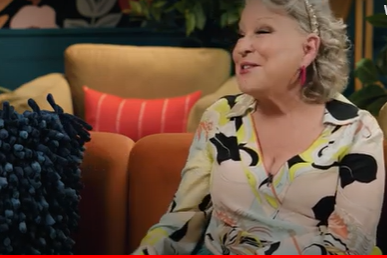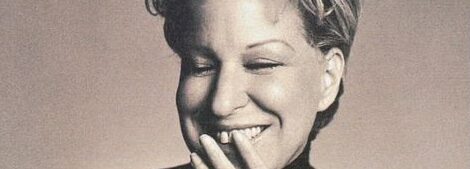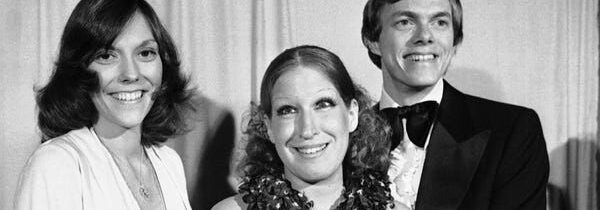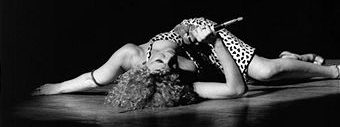OUPBlog
“But you got to have friends…”: A Bette Midler playlist
BY KEVIN WINKLER
July 11, 2024

Bette Midler began her recording career back when Richard Nixon (“Tricky Dick,” as she liked to call him) was still President, and her range and versatility were obvious from the very beginning. Since she first entered a recording studio, she’s tackled just about every genre of music. This tour through her recorded output reveals not just the familiar best-selling hits but five decades of deep cuts and delightful discoveries. Take a listen for yourself:

- “Boogie Woogie Bugle Boy” (1972)
Midler’s affinity for 1940s music resulted in her first top ten hit: a period-perfect recasting of this Andrews Sisters’ World War II boogie woogie smash. Multi-track layering gave us Midler as Patty, Maxene, and LaVerne, all in perfect harmony.
If you like that, try this: “It’s the Girl” (2014): Decades on, Midler’s harmony chops were undiminished as she revisited this swinging 1930s hit by the Boswell Sisters, one of her childhood favorites.
- “Do You Want to Dance?” (1972)
This sultry, slowed-down version of the Bobby Freeman hit opened Midler’s debut album, The Divine Miss M—no album ever got off to a better start. Midler has never sounded more sensuous as she pleads for one more dance in an arrangement that remained a staple of her live concerts into the twenty-first century.
If you like that, try this: “Under the Boardwalk” (1988): Midler brought a similar sexy vibe to this remake of the 1960s Drifters’ hit for the soundtrack of Beaches.
- “Friends” (1972)
This jaunty sing-along ode to the importance of friendship became Midler’s unofficial theme song when she worked at the Continental Baths in the early 1970s and it’s been part of her act ever since. Its lyric, “I had some friends but they’re gone/Something came and took them away,” has meant different things at different stages of her career. In the 1970s it was a promise of solidarity with the gay men who made up her first audiences. During the AIDS epidemic, it acknowledged the unfathomable losses of the gay community. In later years, it marked the passage of time and the inevitable loss of aging friends.
If you like that, try this: “Samedi et Vendredi” (1976): Midler wrote lyrics to many of the songs she’s recorded over the years, and this captivating burst of witty wordplay and infectious rhythms is one of her best. Singing all the voices––and doing it entirely in French––Midler sounds like she’s gathered all her friends into one room and let them run wild.
- “Hello in There” (1977)
Midler the actress made a meal out of John Prine’s poignant ballad about an old couple facing the end of an uneventful life. On her 1977 Live at Last album, she prefaced the song with an outlandish monologue about a giant, bald-headed woman on the streets of New York wearing a fried egg on her head, turning the fried egg into a metaphor for the existential anxieties of our era. After that introduction, “Hello in There” was more heart-wrenching than ever.
If you like that, try this: “Waterfalls” (2014): Midler turned TLC’s rambling scenario about mothers’ inability to keep their sons safe from the horrors of street crime and AIDS into a stripped down, mournful ballad.
- “I Shall Be Released” (1973)
Midler claimed ownership of every song she ever sang. In the case of Bob Dylan’s classic lament for an incarcerated man, she turned it into a furious feminist cry. Barry Manilow’s piano arrangement slowly builds in intensity as it takes Midler from quiet resignation to righteous anger.
If you like that, try this: “Beast of Burden” (1983): Midler did a similar renovation of Keith Richards and Mick Jagger’s teasing riff aimed at a reluctant lover, redefining it as a woman’s demand for respect.
- “Cradle Days” (1979)
Possibly the greatest vocal Midler ever laid down. In this slow-burning soul shouter, she’s a modern-day Medea pleading with a departing husband to restore both their relationship and their shared children. Her singing is equal parts untamed and tightly disciplined, all of it cushioned in creamy backing vocals led by Luther Vandross. Sublime.
If you like that, try this: “Birds” (1977): Midler’s take on Neil Young’s gentle breakup song gives it a driving R&B edge and features fierce vocal back-up from the Harlettes.
- “Stay With Me” (1979)
Midler’s film debut as a tortured Janis Joplin-like star in The Rose gave her plenty of opportunities to rock. But her best moments demonstrated her (and Joplin’s) feel for combining rock and soul, as in this staggering plea to a lover as he heads out the door.
If you like that, try this: “When a Man Loves a Woman” (1979): The other great performance number from The Rose. Midler sings the old Percy Sledge ballad as a recognition of the difficulty a woman rock star can have finding love. For maximum impact, watch the performance clips of “Stay With Me” and “When a Man Loves a Woman” rather than only listening to the audio.
- “Wind Beneath My Wings” (1988)
Midler’s first and (so far) only #1 hit demonstrates her skill at stirring in a bit of vinegar to cut the sticky sweetness. She rides the song’s anthem-like waves, but never falls off into bathos. Even if you’re immune to its message, it’s hard not to be moved by Midler’s sincerity.
If you like that, try this: “Laughing Matters” (1998): This rueful call to keep a sense of humor in a world gone increasingly mad gets a ravishing orchestral backing for one of Midler’s most reassuring vocals.
- “The Rose” (1979)
Just about perfect. The hushed power of Midler’s voice captures the “endless aching need” so vividly evoked in Amanda McBroom’s evergreen hymn—a classic pairing of singer and song.
If you like that, try this: “Lullaby in Blue” (1998): Midler holds back on the emotion and her restraint makes this tender remembrance of a teenage pregnancy deeply affecting.
- “(Your Love Keeps Lifting Me) Higher and Higher” (1973)
Another great Barry Manilow arrangement, this one starts soft but gathers force as Midler and a stentorian choir take it to church. Just when you think she can’t go any higher––or wilder––she reaches even more frenzied heights.
If you like that, try this: “Bang, You’re Dead.” (1977): Midler was known to dabble in disco, and this propulsive Ashford and Simpson production is one of her best in that genre. It’s impossible to stand still when Midler’s scorching vocal rides that four-on-the-floor beat.
- “Mele Kalikimaka” (2006)
Midler frequently evoked her background growing up on the island of Hawaii, and this holiday song, based on the Hawaiian derivation of the phrase, “Merry Christmas,” is an affectionate tribute to her home state.
If you like that, try this: “In the Cool, Cool, Cool of the Evening” (2003): Midler at her good-humored best, swinging lightly through Johnny Mercer’s dense, savory lyrics.
Kevin Winkler enjoyed a career of more than twenty years as a curator, archivist, and administrator at the New York Public Library, prior to which he was a professional dancer. His books include Everything is Choreography: The Musical Theatre of Tommy Tune (2021) and Big Deal: Bob Fosse and Dance in the American Musical (2018), which won the Theatre Library Association’s George Freedley Memorial Award, Special Jury Prize, was a finalist for the Marfield Prize from the Arts Club of Washington, D.C., and was cited as an ALA/ACRL CHOICE Outstanding Academic Title. He is an on-screen commentator for the acclaimed documentary Merely Marvelous: The Dancing Genius of Gwen Verdon (2019).






